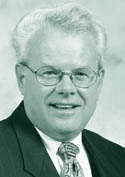This is an archived article. For the latest news, go to the Advance Homepage.
For more archives, go to the Advance Archive/Search Page 
| ||
|
Partnerships can enrich the University but must be planned in accordance with institutional priorities. Just as the blending of metals can lead to alloys of exquisite properties and strengths, unparalleled opportunities are often possible for the University through partnerships. UConn is involved in a wide variety of partnerships with units of the federal or state government, industrial firms or non-profit corporations, and other universities that enhance research and graduate education.
Effective partnerships require good communications, mutual respect, and the development of joint visions, goals and objectives. Like other facets of academic planning and development, partnerships should emerge from university strengths and priorities. Similarly, the non- university partner should bring special capacities and leveraging opportunities to the partnership. Identifying potential non-university partners may begin with interaction between a single investigator and an extramural agency, but partnerships in general should have a broader impact than sole investigators' programs. Because of the challenges and general scope of partnerships, planning typically requires efforts not only at the departmental level but also at the college or school level, and frequently beyond. Indeed, since partnerships involve firms or agencies with very different policies and practices than those found within a university, it behooves partnership architects to find ways to reconcile the extramural policies and practices with those at UConn. Assisting partnership development Key to the University's federally-based efforts is the Washington, D.C.-based government relations firm, Van Scoyoc Associates, engaged by UConn in 1998. Faculty and staff are encouraged to work with department heads, deans and the vice provost's office to determine how their efforts may benefit from University-developed federal initiatives. At the state level, the vice provost's office coordinates contacts with several agencies that assist partnership development with private firms and agencies. For example, working with the non-profit corporation Connecticut Innovations Inc., we recently re-crafted the Critical Technologies Program, which has provided more than $18 million for research and technology development at UConn during the past four years. A new emphasis on project-based funding is creating opportunities for new partnerships with industry. The vice provost's office also works collaboratively with the Center for Science and Technology Commercialization, developed at the Health Center in 1997, which is responsible for patenting and licensing of intellectual property across the University. We have worked with staff of the center to improve efficiencies in disclosure evaluations, patenting and licensing, crucial to partnerships in science- and technology-based fields. Our basic sponsored programs services are vital to UConn's partnerships with extramural agencies. The staff of the office also assist with the work of the University's Conflict of Interest Committee, an area that is particularly important for partnerships with industrial firms. The Office of International Affairs is playing an important role in the development of international partnerships. The office maintains a portfolio of model memoranda of understanding that are helpful to those contemplating partnerships with international universities and other agencies. The Marine Sciences Department recently engaged the office in developing a partnership with the New Zealand Institute of Water and Atmospheric Research Ltd., a collaboration that includes a multilateral arrangement with two other U.S. institutions - the Smithsonian Environmental Research Center and the Virginia Institute of Marine Science. Partnerships may also involve special opportunities to augment sponsored research through donations or gifts. In such cases, staff of the UConn Foundation should be engaged. Facing the challenges Partnerships also involve memoranda of understanding and contractual arrangements that require definition of items such as budgetary arrangements, deliverables, intellectual property and publication rights, and facilities use. All of these require careful negotiation. For example, industrial firms often request intellectual property ownership rights that are inconsistent with University policy and state statutes. As a state institution, the University must insist on ownership of patentable intellectual property developed by its employees. Faculty also have a statutory right to a share of University royalties. Central to the negotiations and the resulting agreements is the understanding that partnerships occur among institutions or agencies, not individuals. A "handshake" or personal interaction is insufficient to form a partnership. Instead, a University office authorized to form such a relationship must be invoked.
|

